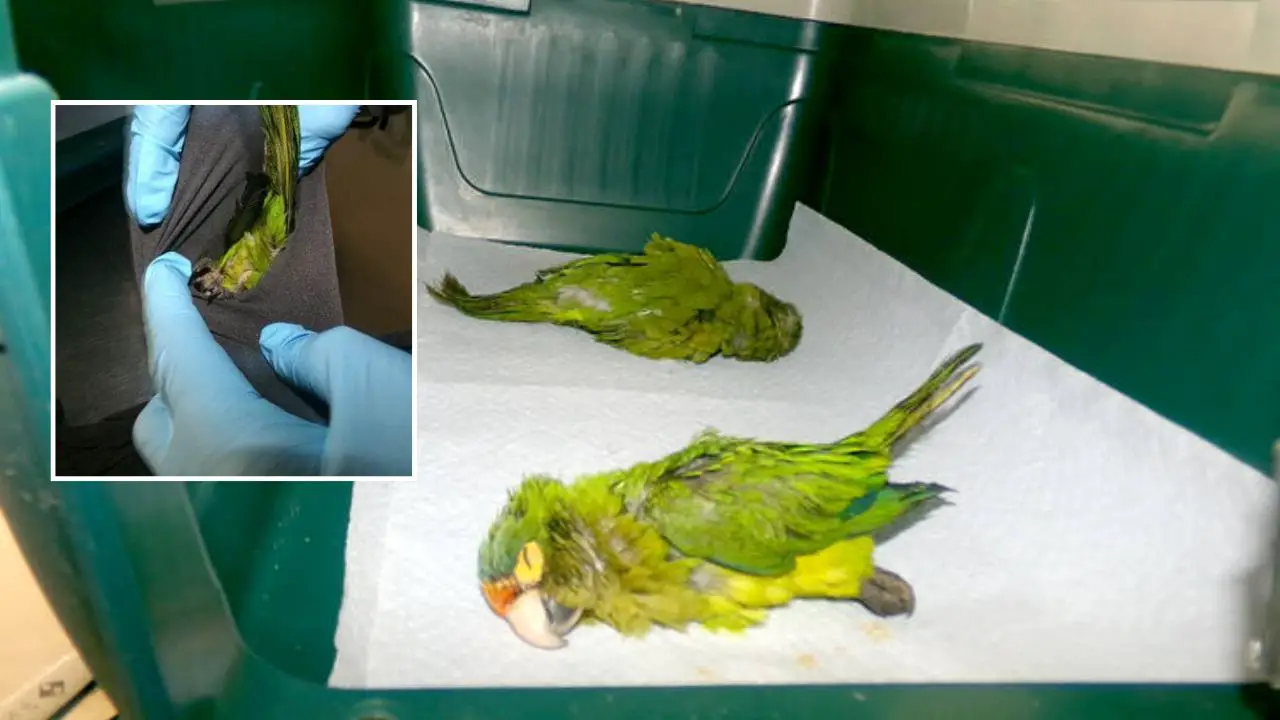San Diego, California – A bizarre and troubling smuggling attempt at the Otay Mesa Port of Entry in San Diego, California, has resulted in federal charges after authorities say a man tried to cross into the United States with sedated, endangered parakeets hidden in his underwear. The suspect, identified as Jesse Agus Martinez, a U.S. citizen residing in Tijuana, is now facing a federal indictment that could lead to significant prison time.
Bulge Noticed During Inspection
The incident took place on October 23, when a Customs and Border Protection officer reportedly noticed a suspicious bulge in Martinez’s groin area as he attempted to enter the country. According to a statement released by the U.S. Attorney’s Office for the Southern District of California, records examined by CBP officers also revealed Martinez, age 35, had a history consistent with prior attempts to smuggle birds into the United States.
Martinez was quickly diverted to a secondary inspection, where officers questioned him about the bulge. He allegedly insisted several times that it was his “pirrin,” a colloquial Spanish word meaning penis. Despite his explanation, officers proceeded with a further check.
Endangered Parakeets Found in Brown Sacks
Upon conducting a physical inspection, CBP officers allegedly discovered two brown sacks hidden inside Martinez’s underwear. Each sack contained an orange-fronted parakeet, a bird species classified as endangered and protected under federal law.
Authorities said both birds appeared heavily sedated and unconscious, though still breathing. The condition of the birds raised immediate concern among inspectors and wildlife officials.
Agents with the U.S. Fish and Wildlife Service arrived at the scene and confirmed the birds were juvenile orange-fronted parakeets, a species native to Western Mexico and Costa Rica. The birds have been formally listed as endangered since 2005, making it illegal to import them without strict protocols.
Risks Associated With Illegal Bird Smuggling
The U.S. Attorney’s Office emphasized that smuggling endangered birds into the country presents serious biosecurity risks. Had the parakeets successfully entered the U.S. in this condition, they would have completely bypassed federal quarantine procedures designed to prevent the spread of dangerous diseases.
One such concern is highly contagious avian influenza, a virus that can be lethal to both wild bird populations and domesticated poultry. Proper screening and quarantine procedures are essential to protecting the broader ecosystem and agricultural industries.
In their statement, prosecutors wrote that the birds’ illegal transport “could have posed a threat to avian health if they were carrying infectious diseases.”
Birds Now Receiving Proper Care
Following the discovery, the sedated parakeets were cared for by Veterinary Services stationed at the southern border. Officials reported that the young birds have since recovered from their sedated state. They were ultimately transferred to a Department of Agriculture Animal Import Center for mandatory quarantine and monitoring.
Read Also: 10-Year-Old Boy Among 2 Killed in New Jersey Shooting That Also Injured 3
Federal officials confirmed the birds are now in stable condition.
Federal Charges Filed
Martinez was indicted by a federal grand jury on Friday and charged with Importation Contrary to Law, a serious smuggling offense. According to federal records, if he is convicted, Martinez faces a maximum sentence of 20 years in federal prison and a $250,000 fine.
The U.S. Attorney’s Office has not released additional details about prior incidents, but officials noted that Martinez’s recorded history suggests an ongoing pattern involving the illegal transportation of birds.
What Happens Next
The case will now proceed through federal court, where prosecutors are expected to argue that Martinez knowingly concealed endangered wildlife in a manner that violated multiple importation laws. The investigation remains ongoing from both a criminal and wildlife-protection standpoint.
Authorities continue to stress that smuggling wildlife — particularly endangered species — not only threatens vulnerable animal populations but also poses significant health risks that federal quarantine regulations aim to prevent.
Stay Updated
For more updates, analysis, and related coverage on cases like this, visit mikeandjonpodcast.com.




